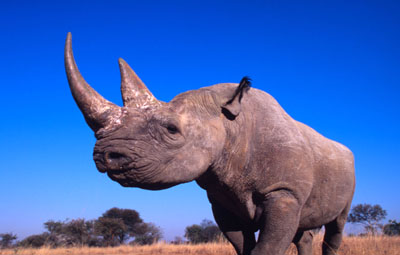Geneva, Switzerland — Rhino poaching worldwide is poised to hit a 15-year-high driven by Asian demand for horns, according to new research.
Poachers in Africa and Asia are killing an ever increasing number of rhinos—an estimated two to three a week in some areas—to meet a growing demand for horns believed in some countries to have medicinal value, according to a briefing to a key international wildlife trade body by WWF, the International Union for the Conservation of Nature (IUCN) and their affiliated wildlife trade monitoring network TRAFFIC.
The impact in Africa
An estimated three rhinos were illegally killed each month in all of Africa from 2000-05, out of a population of around 18,000. In contrast, 12 rhinoceroses now are being poached each month in South Africa and Zimbabwe alone, the three groups told the 58th meeting of the Convention on International Trade in Endangered Species Standing Committee this week in Geneva.
“Illegal rhino horn trade to destinations in Asia is driving the killing, with growing evidence of involvement of Vietnamese, Chinese and Thai nationals in the illegal procurement and transport of rhino horn out of Africa,” the briefing states.
The impact in Asia
Meanwhile, rhino poaching is also problematic in Asia. About 10 rhinos have been poached in India and at least seven in Nepal since January alone—out of a combined population of only 2,400 endangered rhinos.
“Rhinos are in a desperate situation,” said Dr. Susan Lieberman, Director of the Species Programme, WWF-International. “This is the worst rhino poaching we have seen in many years and it is critical for governments to stand up and take action to stop this deadly threat to rhinos worldwide. It is time to crack down on organized criminal elements responsible for this trade, and to vastly increase assistance to range countries in their enforcement efforts.”
Almost all rhino species are listed in CITES (the Convention on Trade in Endangered Species of Wild Fauna and Flora) in Appendix I, which means that any international trade of any rhino parts for commercial purposes is illegal.
“Increased demand for rhino horn, alongside a lack of law enforcement, a low level of prosecutions for poachers who are actually arrested and increasingly daring attempts by poachers and thieves to obtain the horn is proving to be too much for rhinos and some populations are seriously declining,” said Steven Broad, Executive Director of TRAFFIC.
The situation is particularly dire in Zimbabwe where such problems are threatening the success of more than a decade’s work of bringing rhino populations back to healthy levels.
For example, earlier this week a park ranger arrested with overwhelming evidence against him for having killed three rhinos in the Chipinge Safari Area, was acquitted without any satisfactory explanation for the verdict. Similarly, in September 2008, a gang of four Zimbabwean poachers who admitted to killing 18 rhinos were also freed in a failed judiciary process.
The briefing concludes that governments need “an accurate and up-to-date picture of the status, conservation and trade in African and Asian rhinoceroses, as well as the factors driving the consumption of rhinoceros horn, so that firm international action can be taken to arrest this immediate threat to rhinoceros populations worldwide.”
“Rhino populations in both Africa and Asia are being seriously threatened by poaching and illegal trade,” said Dr Jane Smart, Director of IUCN’s Biodiversity Conservation Group. “IUCN and its African and Asian Rhino Specialist Groups are working hard to gather data and information on rhinos so that CITES parties can make informed decisions and ensure that rhinos are still here for generations to come.”
The 58th meeting of the CITES Standing Committee is being held in Geneva from 6 -10 July. This issue will be further discussed at the 15th meeting of the Conference of the Parties to CITES, which will be held in Doha, Qatar March 13-25, 2010.














